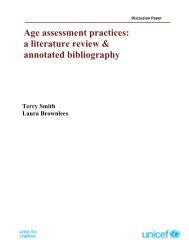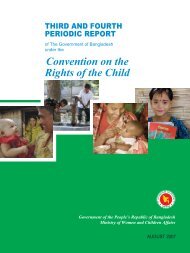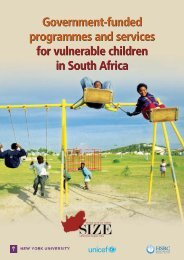EFA Goal 1: Early childhood care and education; Asia ... - Unicef
EFA Goal 1: Early childhood care and education; Asia ... - Unicef
EFA Goal 1: Early childhood care and education; Asia ... - Unicef
Create successful ePaper yourself
Turn your PDF publications into a flip-book with our unique Google optimized e-Paper software.
4.9 Summary of priority areas for the region<br />
It is clear from the previous sections that there is a need to determine realistic <strong>and</strong> achievable<br />
priority areas that are rooted in a country context but that also ensure the holistic development of<br />
all children. One urgent priority that has emerged in the region is the need for the development<br />
or elaboration of new <strong>and</strong> existing outcome measures of ECCE. This may involve the use of more<br />
elaborated outcome measures that go beyond <strong>education</strong> outcomes to include indicators such as<br />
(ARNEC, 2010b):<br />
physical health <strong>and</strong> motor development<br />
social <strong>and</strong> emotional development<br />
moral <strong>and</strong> spiritual development<br />
cognition <strong>and</strong> general knowledge<br />
language development<br />
arts <strong>and</strong> creativity<br />
approaches towards learning.<br />
The development of such measures should include evidence-based knowledge generation<br />
<strong>and</strong> management. Such initiatives can identify gaps <strong>and</strong> point to the need for developing new<br />
measures where necessary. For example, a st<strong>and</strong>ards measure in a particular country may reflect<br />
spiritual dimensions more because of the cultural salience of spirituality for that country. A key<br />
strategy to address the need for evidence would be a <strong>care</strong>ful mapping of existing programmes <strong>and</strong><br />
noteworthy practices, gathered from diverse sectors (NGOs, ministries <strong>and</strong> academia), which can<br />
provide useful national pictures of what works <strong>and</strong> what does not. Resources can then be efficiently<br />
allocated <strong>and</strong> used towards strengthening programmes for national scaling up <strong>and</strong> to identify new<br />
programmes based on needs.<br />
A related priority area for the region is ensuring clear coordinating mechanisms between sectors.<br />
Research <strong>and</strong> mapping exercises in the region highlight the need for establishing formal, ‘spelledout’<br />
arrangements <strong>and</strong> guidelines for “who does what” in programme management, monitoring<br />
<strong>and</strong> evaluation. Two countries (Bangladesh <strong>and</strong> Philippines) have already pointed to the need for<br />
m<strong>and</strong>ated collaboration to keep the coordinating mechanism dynamic <strong>and</strong> strong. The m<strong>and</strong>ate<br />
could come from the text of the policy/guiding framework itself or it could come from the formal<br />
written arrangement between the nodal agency <strong>and</strong> other parties. Frequently, such coordinating<br />
mechanisms include national, provincial <strong>and</strong> local administrative units <strong>and</strong> actors (Cambodia,<br />
Philippines, Sri Lanka <strong>and</strong> Thail<strong>and</strong>) <strong>and</strong> can provide the impetus for the strengthening of policies.<br />
For countries that are still in the process of developing ECCE policies, this means they do not have<br />
to engage in the process of developing efforts <strong>and</strong> initiatives from scratch. Lessons from other<br />
countries indicate that useful strategies include leveraging existing mechanisms <strong>and</strong> articulating<br />
roles <strong>and</strong> responsibilities with greater clarity <strong>and</strong> definition. For example, in Thail<strong>and</strong>, the Book Start<br />
programme is already an established mechanism of collaboration between the health ministry (as<br />
the primary <strong>care</strong> <strong>and</strong> service provider) <strong>and</strong> the <strong>education</strong> ministry. In Sri Lanka <strong>and</strong> Indonesia, the<br />
existing infrastructure in the health sector as the first service provider to families is used as the entry<br />
point for providing holistic ECCE services.<br />
A third, urgent priority area in this region is the development of sound costing (including costbenefit<br />
analysis) <strong>and</strong> financial planning measures for effective programmes. This includes <strong>care</strong>ful<br />
consideration of i) the types of service delivery models to be promoted, ii) proposed outcomes <strong>and</strong><br />
targets, iii) resources available <strong>and</strong> needed <strong>and</strong> iv) the financial costs of providing these resources.<br />
Sri Lanka recently engaged in a marginal budgeting for bottleneck analysis that involves estimating<br />
incremental costs <strong>and</strong> benefits for addressing bottlenecks or systemic limitations in effective<br />
programming (ARNEC, 2009). Save the Children has also initiated a cost-benefit analysis of the ECCE<br />
programme supported by the <strong>education</strong> ministry. This kind of analysis is helpful in ensuring that the<br />
models put forth for scaling up are cost effective <strong>and</strong> sustainable.<br />
<strong>EFA</strong> <strong>Goal</strong> 1: <strong>Early</strong> Childhood Care <strong>and</strong> Education<br />
35

















